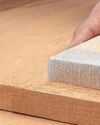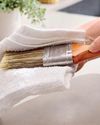Denemek ALTIN - Özgür
Fixing mouldy silicone IN THE BATHROOM
The Home Handyman
|January/February 2023
Close your eyes, try to visualise what the corners in your shower and around your bath look like. Are they pristine and spotless? If so, then then this article probably isn't for you. However, if they're anything like mine you might want to keep reading.
-
Supplies
It's a short list of supplies for this project. You'll need:
• A tube of clear kitchen and bath silicone (try to avoid the cheap stuff!)
• A silicone gun
• A roll of painters tape
• A flat-blade knife like a boxcutter or a razor blade
As a contractor, I see two very common problems in a lot of bathrooms (including my own!) and in this article, I'm going to show you how to fix them.
The first is sloppily applied silicone. Amateur builders love to lay on heaps of silicone in the bathroom. It covers a lot of sins and at first, it doesn't look that bad. The problem is that over time those big thick silicone lines are the perfect place for mould to grow. Yip, those black spots accumulating in the corner, those are mould, unfortunately. The more silicone you use, the faster the mould will grow and spread.
The second is that many people use white silicone in bathrooms. I get what they are thinking, there's lots of white stuff in the bathroom. The toilet, the bath, the sink, etc, it's all white. Here's the thing though, there are a million different shades of white. So, there's a 99% chance that the white silicone isn't going to match anything in the bathroom. It's almost certainly at least a little bit off.
Let's fix both of them at the same time!

Step-by-step guide
Step 1: Prep
The first step is going to be an easy one. Just remove everything you can so that you have room to work. All of those shampoo bottles in the corner? Yes. They are going to have to go. Shower curtain? If you can, pull it down. The more room to work you the easier this job is going to be.
Bu hikaye The Home Handyman dergisinin January/February 2023 baskısından alınmıştır.
Binlerce özenle seçilmiş premium hikayeye ve 9.000'den fazla dergi ve gazeteye erişmek için Magzter GOLD'a abone olun.
Zaten abone misiniz? Oturum aç
The Home Handyman'den DAHA FAZLA HİKAYE

The Home Handyman
KEEP YOUR HOUSE CRITTER FREE
With winter fast approaching, outdoor critters seeking to regulate their temperature are trying their best to get inside. Ants, spiders, moths, mosquitoes, fruit flies, stink bugs, termites, silverfish, and ladybugs, to name a few, can easily make their way into homes, and once they've settled in, it's often hard to get them out.
6 mins
Jul/Aug'25

The Home Handyman
SECRET HIDEOUTS
We all have things we would prefer to keep out of plain sight - family heirlooms, wedding rings, expensive jewellery, medicines or even weapons. Sometimes we just want to keep household items hidden in order to declutter a space. Whether you want to hide items for safety or financial reasons, or simply want to keep your bedroom tidy, there are a few clever storage ideas that could help you out.
2 mins
Jul/Aug'25

The Home Handyman
ABRASIVES DEMYSTIFIED
Abrasive materials are indispensable in countless industries, from woodworking and metal fabrication to automotive repair and electronics manufacturing.
3 mins
Jul/Aug'25

The Home Handyman
THINNERS VS. TURPENTINE
If you've ever finished a painting or staining job and been left wondering how best to clean your brushes, you're not alone. One of the most common DIY questions is: Should I use thinners or turpentine to clean my brushes? The answer depends on the type of paint or coating you've used. Using the wrong solvent can damage your brushes, or worse, make the cleaning job even harder.
2 mins
Jul/Aug'25

The Home Handyman
KEEP THE COLD OUT
Did you know that homes in South Africa are either insulated to a poor standard, compared to European nations, or have no form of insulation at all. In 2011 our National Building Regulations made it compulsory to fit thermal insulation in new buildings and additions to building structures.
5 mins
Jul/Aug'25

The Home Handyman
ANGLE GRINDERS — MASTERING THIS VERSATILE TOOL
When it comes to versatile tools in a DIYer's arsenal, few can match the power and practicality of the angle grinder.
2 mins
Jul/Aug'25

The Home Handyman
KITCHEN CARE – MAINTENANCE TIPS FOR KEY AREAS
The kitchen is the heart of the home where meals are made, memories are shared, and chaos sometimes reigns. But like any hardworking space, your kitchen needs regular maintenance to keep it functional, safe, and looking great.
2 mins
Jul/Aug'25

The Home Handyman
Separating Fact from Fiction
Maintaining your home can be a daunting task, especially with the plethora of DIY tips and tricks floating around the internet.
2 mins
Jul/Aug'25

The Home Handyman
SEALANTS SIMPLIFIED: WHAT TO USE AND WHERE
Whether you’re tackling a weekend DIY fix, remodelling your home, or involved in large-scale construction, sealants are a silent hero that play a vital role in creating watertight, airtight, and secure finishes.
3 mins
Jul/Aug'25

The Home Handyman
COMMON FRIDGE/FREEZER FAULTS
Your fridge freezer is one of the hardest-working appliances in your home, so when it stops performing as it should, it can cause major inconvenience. The good news? Not every fault means an expensive call-out or a trip to the shops for a new one. In many cases, you can fix the issue yourself with a little know-how and a few basic tools.
3 mins
Jul/Aug'25
Translate
Change font size

